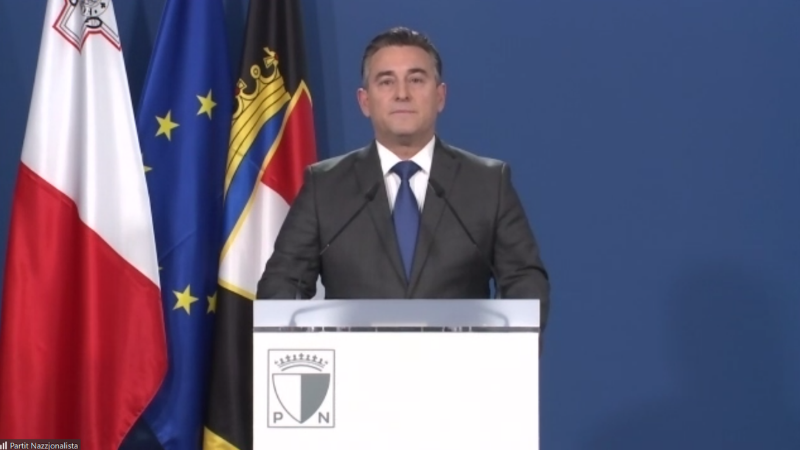Updated to include the reaction of the Daphne Caruana Galizia Foundation.
The Opposition said it has not been consulted on the setting up of a committee responsible for the implementation of the recommendations proposed by the public inquiry board that investigated the assassination of Daphne Caruana Galizia, despite the government’s announcement of ‘broad consultation’ before it reveals more details in “the coming days”.
Opposition Leader Bernard Grech was asked about the extent of involvement in the committee’s set up, meant to oversee the implementation of recommendations by the board on press freedom, during a press conference held earlier today in which he announced a comprehensive Bill (incorporates 12 different Bills) to move forward on reforms on which the government has been “dragging its feet”.
“I can assure you that in spite of the fact that we are always willing to help the government for the good of the country, in spite of our several offers for a helping hand, this government didn’t consult us on this, at least not officially,” Grech replied. “Unfortunately, while we are always open to collaboration, it depends on the prime minister to accept that invitation.”
The government immediately issued a statement saying that it had consulted widely and will be announcing developments in the coming days. The consultation was so broad that The Shift was excluded, but we are informed that the government intends to announce Media Today co-owner Saviour Balzan as forming part of this commission.
Balzan is currently at the centre of controversy as at least 29 government entities are challenging the authority of the Data Protection Commissioner to attempt to overturn a decision to grant information on the government contracts he received, mostly through direct orders, for consultation services to government ministers and public entities.
The Shift has revealed that Balzan has earned at least €1 million through government contracts since Labour was returned to power in 2013.
Other names being mentioned are The Times of Malta’s chief editor Herman Grech and assistant editor for the same paper Matthew Xuereb, as well as academic and Labour Party activist Carmen Sammut.
The PN’s proposals
Grech explained that the PN’s parliamentary group has “unanimously approved an unprecedented draft of a Bill” containing 12 separate Bills.
Grech said the Party’s proposals are based on both the public inquiry’s recommendations as well as “addressing other issues related to governance”. The Party promised to provide further detail on the proposals throughout the week.
“One of the acts provides for the highest possible protection for the rights of the free press – it is not enough to keep paying lip service to this,” Grech stated.
“We need to provide constitutional protections for the rights of the free press in this country, so every journalist and every media house can investigate, ask, and write what it needs to hold politicians accountable,” he added, further referring to another proposal which would provide protection against vexatious lawsuits meant to financially cripple journalists and preventing stories from being published.
Two of the major changes being proposed would lead to the creation of a special inquiring magistrate against corruption who would have wide-ranging powers at their disposal as well as the creation of unexplained wealth orders.
“Whenever one has individuals who have committed serious crimes that carry a sentence larger than nine years and have, among other things, accumulated great wealth which cannot be explained, this act would ensure that that explanation needs to be given,” the Opposition Leader said.
Another major change that would be implemented should the proposed Bill go through would be the creation of laws that specifically outlaw organised criminal activity, probably similar to anti-mafia laws created in Italy for the same purposes.
The opposition is also seeking to criminalise obstruction of justice through violence, bribery, or threats or other similar methods, dereliction of duty from public officials “who are in charge of enforcing laws”, the use of non-official communications by public officials on public duty and the general abuse of public office.
The PN’s raft of Bills also provides an outline of the duties of government in terms of safeguarding public interest as well as providing for the creation of an interim government whose purpose would be to run the administration after parliament is temporarily suspended in the run-up to a general election.
When answering questions from journalists about the exclusion of one of the public inquiry’s major recommendations, which among other things referred to the need to introduce laws that regulate the relationship between politicians and big businesses, Grech said the Party “did not exclude any further additions to the laws we already have presented”.
Welcome move
The Daphne Caruana Galizia Foundation welcomed the move by the Opposition, saying in a statement that it was an “opportunity for Malta to progress”.
“We welcome today’s news that draft laws to be presented in parliament shortly will incorporate recommendations made by the public inquiry into Daphne Caruana Galizia’s assassination. The proper implementation of the inquiry’s findings and recommendations presents an opportunity for Malta to mature into a modern democracy and a positive example for the rest of Europe.
If the process of reform is effective, we may at least have the satisfaction of knowing that Daphne’s death will strengthen our country’s democracy and save the lives of others,” the foundation said.
Caruana Galizia was assassinated by a car bomb in Malta on 16 October 2017.














Well done Dr Grech and the PN. Such laws should be the catalyst to restoring sanity and reputation to this Island.
An important detail, would be the design and building of a special prison for politically exposed persons, with conditions that will make them highly regret their crimes against society.